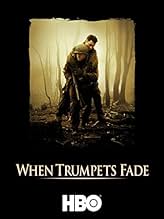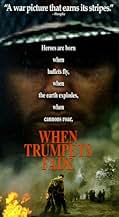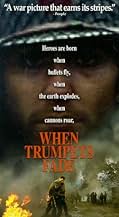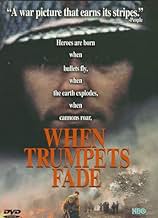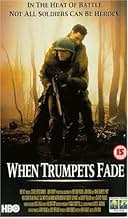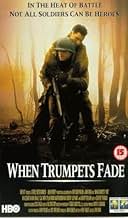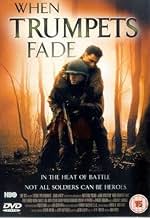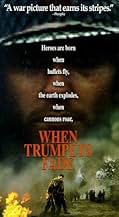AVALIAÇÃO DA IMDb
7,0/10
8,9 mil
SUA AVALIAÇÃO
Adicionar um enredo no seu idiomaA private in the latter days of WWII on the German front struggles between his will to survive and what his superiors perceive as a battlefield instinct.A private in the latter days of WWII on the German front struggles between his will to survive and what his superiors perceive as a battlefield instinct.A private in the latter days of WWII on the German front struggles between his will to survive and what his superiors perceive as a battlefield instinct.
- Direção
- Roteirista
- Artistas
- Prêmios
- 1 vitória e 5 indicações no total
Frank-Michael Köbe
- German Sergeant
- (as Frank Köbe)
Matthew Rutson Cooney
- Driver Corporal
- (as Matthew Ruston Cooney)
Brian Hicks
- 1st Sergeant
- (as Gy. Sgt. Brian Hicks USMC)
John Miller
- Radio Man
- (as Cpl. John Miller USMC)
Peter Thomas
- News Footage Narrator
- (narração)
Avaliações em destaque
WHEN TRUMPETS FADE is one of the very best recent WWII films. It doesn't have anywhere near the scope of something like SAVING PRIVATE RYAN, but it captures what it was like to fight as a typical "grunt" in Europe during the winter of '44-'45--and what it's like to fight in a war anywhere--about as well as any movie can. Appropriately enough, its setting is the bloody, intense Battle of Hürtgen Forest, the longest single engagement in the history of the United States Army and one that, ironically, many of the history books largely ignore. Many experts now believe that this battle should have been avoided altogether.
Ron Eldard gives a really fine performance as "Manning," a reluctant draftee-type who's "not about to take a bullet for anyone." One of the best aspects of this film is the way it shows the psychology--and irony--of how Manning's higher-ups use him via a combination of threats, flattery, and promotions just to take one small strategic spot during the battle. Just about everyone else in the film--American or German, I don't believe that there are any non-military characters --gives a commendably believable performance, but special mention goes to Zak Orth, who plays a typical replacement who, young, green, and unsoldierly though he may seem, turns out to be a fine soldier, and Martin Donovan as Captain Pritchett, a typically ruthless, uncaring commander to the men in his company but a bit of a Private Manning himself to his superior officers.
Like most of today's war films, WHEN TRUMPETS FADE is gory, disturbing, and, by necessity (since it's about an unpopular and rather ineffectual battle), somewhat depressing. Still, the dialogue, battle footage, and various other aspects are nothing if not realistic. WHEN TRUMPETS FADE captures the cynicism of war-in-general incredibly well.
Ron Eldard gives a really fine performance as "Manning," a reluctant draftee-type who's "not about to take a bullet for anyone." One of the best aspects of this film is the way it shows the psychology--and irony--of how Manning's higher-ups use him via a combination of threats, flattery, and promotions just to take one small strategic spot during the battle. Just about everyone else in the film--American or German, I don't believe that there are any non-military characters --gives a commendably believable performance, but special mention goes to Zak Orth, who plays a typical replacement who, young, green, and unsoldierly though he may seem, turns out to be a fine soldier, and Martin Donovan as Captain Pritchett, a typically ruthless, uncaring commander to the men in his company but a bit of a Private Manning himself to his superior officers.
Like most of today's war films, WHEN TRUMPETS FADE is gory, disturbing, and, by necessity (since it's about an unpopular and rather ineffectual battle), somewhat depressing. Still, the dialogue, battle footage, and various other aspects are nothing if not realistic. WHEN TRUMPETS FADE captures the cynicism of war-in-general incredibly well.
The film makers obviously intended a memorial to the soldiers who fought and died in the Hurtgen Forest. Though this was not a docudrama, the story had to be true to the context, and for what I could tell, it definitely achieved that goal. The Battle was not a victory for the U.S. forces. The Germans pushed back the Allies during this battle, creating the "bulge" in the front lines. The Battle of the Bulge was a later victory, and it is duly remembered. But the Hurtgen Forest campaign, which was a defeat and by many commentators is viewed as a huge strategic blunder paid for in American blood, has largely been forgotten.
Why does everyone (including viewers) assume that Manning is a coward? Because he is the only survivor of his platoon? Perhaps that assumption accurately reflects the command mindset which caused so many deaths: death is so cheap that one more death is expected, in order to prove valor. (That is not a new concept, "The Red Badge of Courage" had it in a Civil War context; but it also seems to be a motivation for contemporary suicide bombers.) Contrast that with these soldiers' motives for the last mission--when the objective was clear: to save their own lives, rather than to make a noble but unavailing gesture.
Usually war films have more plot. But the Hurtgen Forest campaign was not as carefully plotted as a screenplay. Did any mission in this film seem to have any real point? The battle is accurately reflected here. This is not a compelling film, and it does not attempt to impart any great moral lessons, but it's best virtue is that it is honest.
My late father was in the "Bloody Bucket" (the 28th Infantry, Pennsylvania National Guard--note the red keystone insignia) during this battle, and he was fortunate to have survived. Decades later, he often would say to me that the trees could kill you. I was never really sure what he meant. This film showed me what he meant: the tree tops which were blown off by artillery fire would fall on the soldiers below.
Why does everyone (including viewers) assume that Manning is a coward? Because he is the only survivor of his platoon? Perhaps that assumption accurately reflects the command mindset which caused so many deaths: death is so cheap that one more death is expected, in order to prove valor. (That is not a new concept, "The Red Badge of Courage" had it in a Civil War context; but it also seems to be a motivation for contemporary suicide bombers.) Contrast that with these soldiers' motives for the last mission--when the objective was clear: to save their own lives, rather than to make a noble but unavailing gesture.
Usually war films have more plot. But the Hurtgen Forest campaign was not as carefully plotted as a screenplay. Did any mission in this film seem to have any real point? The battle is accurately reflected here. This is not a compelling film, and it does not attempt to impart any great moral lessons, but it's best virtue is that it is honest.
My late father was in the "Bloody Bucket" (the 28th Infantry, Pennsylvania National Guard--note the red keystone insignia) during this battle, and he was fortunate to have survived. Decades later, he often would say to me that the trees could kill you. I was never really sure what he meant. This film showed me what he meant: the tree tops which were blown off by artillery fire would fall on the soldiers below.
In 1944, in Hurtgen Forest in the border of Belgium, Pvt. David Manning (Ron Eldard) is the only man of his company to survive a battle in the woods. He joins a new company trying to get a medical waive, and although having difficulties to respect his superiors, he is promoted to sergeant due to his leadership and instinct of survival. After a new battle, when he destroys the German cannons, he is promoted to lieutenant.
"When Trumpets Fade" is a great surprise: totally unknown in Brazil, without any publicity, it is indeed an excellent war movie. Based on a true story, the Hurtgen Forest Battle, where 24,000 soldiers died, this film shows, without any clemency or romance, how stupid a war is. The soldiers are moved by the instinct of survival, and not by patriotism like other movies usually present. The battle scenes are amazingly real, showing shattered bodies or man losing parts of their bodies. A must-see movie, recommended for audiences who look for raw and naked true story, with magnificent interpretations and direction. My vote is nine.
Title (Brazil): "Quando os Bravos se Calam" ("When the Braves Silence")
"When Trumpets Fade" is a great surprise: totally unknown in Brazil, without any publicity, it is indeed an excellent war movie. Based on a true story, the Hurtgen Forest Battle, where 24,000 soldiers died, this film shows, without any clemency or romance, how stupid a war is. The soldiers are moved by the instinct of survival, and not by patriotism like other movies usually present. The battle scenes are amazingly real, showing shattered bodies or man losing parts of their bodies. A must-see movie, recommended for audiences who look for raw and naked true story, with magnificent interpretations and direction. My vote is nine.
Title (Brazil): "Quando os Bravos se Calam" ("When the Braves Silence")
Two years ago a WWII veteran asked me if I saw WHEN TRUMPETS FADE, the story of the battle for Heurtgen Forest. He said that he was wounded in the battle, which history has almost forgotten because it was so overshadowed by the Battle of the Bulge starting several days later.
He informed me that it was chilling in it's dead-on accuracy, not only of the events within the battle itself but of the ferocity of carnage that permeated the senses 24/7 of everyone who was there.
After watching it, I realized this was not a "Let's travel to Middle Earth, and slay the dragon fantasy" but a testimony to the barvery, or lack of it, in battle, that men must endure to justify their existance, which is continually threatened by the enemy. There isn't room for sub-plots when all that is on your mind is staying alive; and at what cost?
All the performances are exemplary in this regard, Eldard creating a character that is not only believable but admirable in it's honesty.
It should be ranked among the new age of war classics of recent years. But please don't look for any love stories or soul searching introspectives, there wasn't any time for that when you are cursing the very ground to get lower than the bullets flying over your head.
He informed me that it was chilling in it's dead-on accuracy, not only of the events within the battle itself but of the ferocity of carnage that permeated the senses 24/7 of everyone who was there.
After watching it, I realized this was not a "Let's travel to Middle Earth, and slay the dragon fantasy" but a testimony to the barvery, or lack of it, in battle, that men must endure to justify their existance, which is continually threatened by the enemy. There isn't room for sub-plots when all that is on your mind is staying alive; and at what cost?
All the performances are exemplary in this regard, Eldard creating a character that is not only believable but admirable in it's honesty.
It should be ranked among the new age of war classics of recent years. But please don't look for any love stories or soul searching introspectives, there wasn't any time for that when you are cursing the very ground to get lower than the bullets flying over your head.
When Trumpets Fade is a great movie, with excellent action sequences, fine acting and a sound storyline. It's better than Platoon, and I'd put it up there with 84 Charlie Mopic, except that it deals with infantry warfare during WWII. It came out after a series of real to life WWII movies, Saving Private Ryan, The Thin Red Line, but is made on a smaller budget and apart from Ryan's opening scene, it is a better movie. The cast consists of thoroughly unknown but very skilled actors, and the movie gives you a feel of what it must have been like to be on the front line in the Huertgen Forrest in Germany, late 1944. The Hungarian location adds realism as well.
The story basically revolves around the single minded efforts of private (then sergeant, then lieutenant) Manning (Ron Eldard) to stay alive and out of the meatgrinder that is conventional warfare, no matter what, even though ironically, the fact that he survives means that he has to put up for ever more dangerous tasks because he's the only one near who has any close-up experience.
I'll add that the videostore I go to allows you to rent 5 movies for the price of 3, and keep them for a full week. Every day after watching another movie, I couldn't help but re-watch "When Trumpets Fade", and every time I found something new and something more made sense to me.
This is one outstanding movie, very well produced and if you like war movies from the grunt's point of view, don't miss it.
The story basically revolves around the single minded efforts of private (then sergeant, then lieutenant) Manning (Ron Eldard) to stay alive and out of the meatgrinder that is conventional warfare, no matter what, even though ironically, the fact that he survives means that he has to put up for ever more dangerous tasks because he's the only one near who has any close-up experience.
I'll add that the videostore I go to allows you to rent 5 movies for the price of 3, and keep them for a full week. Every day after watching another movie, I couldn't help but re-watch "When Trumpets Fade", and every time I found something new and something more made sense to me.
This is one outstanding movie, very well produced and if you like war movies from the grunt's point of view, don't miss it.
Você sabia?
- CuriosidadesThe red keystone unit patch signifies that Manning and the others are part of the The 28th Infantry Division. The 28th is a unit of the Army National Guard and is the oldest division-sized unit in the US armed forces.
- Erros de gravaçãoThe Dragons teeth of the Siegfried line are not shown as they really were (and in numerous places still are today). 1) In the movie the line is built with four rows of teeth. In reality the line is built with five rows. 2) The teeth are in reality not made in one size as shown in the movie, but in 3 different sizes, where the first and last rows contain the biggest pillars, the middle three are middle sized, and woven in the last row you can find the smallest. 3) The rows are not placed exactly behind each other. If you would see them from above, you would see an angle in the middle. 4) The rows of pillars are also not built in one line. If you would look over a row from the side, you would see a zigzag of pillars. 5) The pillars in the movie are too close to each other. In reality, the area between two pillars is so big, you can park a car between them (as is done by the author of this comment on numerous occasions).
- Citações
Pvt. David Manning: If I can help you in any way without endangering my own life, I won't hesitate. But I'm not taking a bullet for anybody!
Lt. Lukas: That's not good enough.
Pvt. David Manning: That's as good as it gets.
- ConexõesReferenced in Ban the Sadist Videos! (2005)
Principais escolhas
Faça login para avaliar e ver a lista de recomendações personalizadas
Detalhes
- Tempo de duração1 hora 35 minutos
- Cor
- Mixagem de som
- Proporção
- 1.33 : 1
Contribua para esta página
Sugerir uma alteração ou adicionar conteúdo ausente


